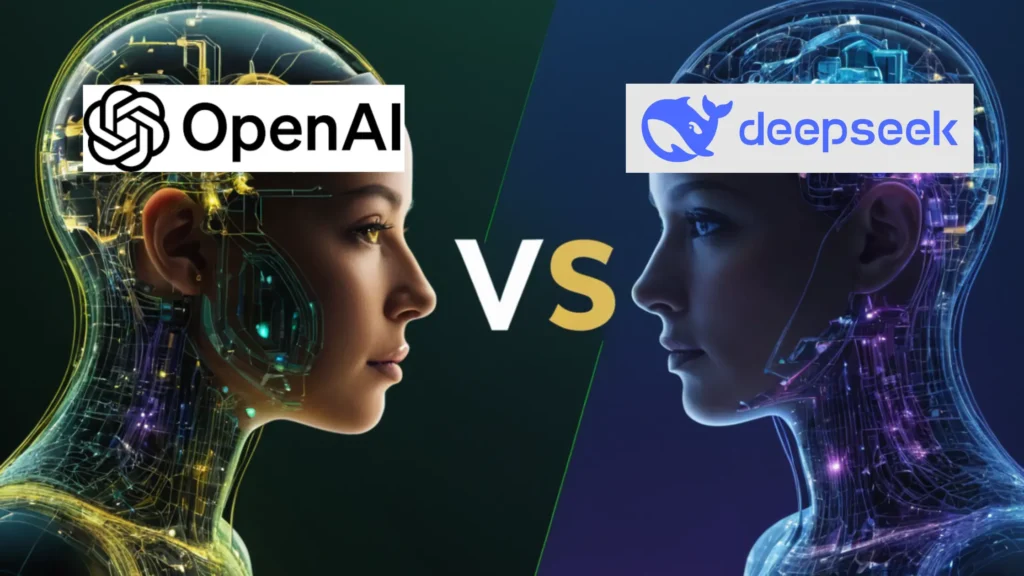What is DeepSeek AI?
DeepSeek AI is a cutting-edge, open-source large language model (LLM) developed in China. Designed for efficiency and affordability, it competes with models like OpenAI’s GPT-4 while reducing hardware dependency through an innovative Mixture-of-Experts (MoE) architecture.
Key Features & Technology
✅ Scalable Architecture: Uses MoE and reinforcement learning for optimized resource allocation.
✅ Open-Source Flexibility: Unlike proprietary models (e.g., ChatGPT), DeepSeek supports community-driven improvements.
✅ Diverse Applications: Performs well in data analysis, content creation, and coding, making it suitable for industries like healthcare, finance, and technology.
DeepSeek AI vs. ChatGPT: Key Differences
| Feature | DeepSeek AI | ChatGPT (GPT-4 Turbo) |
|---|---|---|
| Licensing | Open-source | Proprietary |
| Cost | More affordable | Subscription-based ($20/month) |
| Customization | Highly customizable | Limited |
| Efficiency | Energy-efficient MoE design | Resource-intensive |

Security & Privacy Considerations
🔹 Data Handling: DeepSeek follows Chinese regulations, raising concerns about compliance with global standards like GDPR.
🔹 Potential Risks: While no major breaches have been reported, past API key exposures highlight the need for stronger security measures.
🔹 Content Restrictions: Includes censorship controls, which prevent misuse but may limit free discussions.
Final Thoughts
DeepSeek AI is a promising alternative for those seeking affordable, scalable, and open-source AI solutions. However, concerns around data privacy, security, and regulatory compliance may affect global adoption. As AI continues to evolve, DeepSeek’s impact on the industry—especially in reducing reliance on expensive hardware—is worth watching.
FAQs
Q: What is DeepSeek AI?
A: DeepSeek is an open-source large language model (LLM) developed in China, known for its cost-effective design, Mixture-of-Experts architecture, and applications in coding, data analysis, and content creation.
Q: How does DeepSeek differ from ChatGPT?
A: Unlike ChatGPT’s proprietary model, DeepSeek is open-source, cheaper to scale, and uses energy-efficient architecture. However, ChatGPT offers broader versatility and a stronger user base.
Q: Who created DeepSeek?
A: Its founders remain undisclosed, but it is funded by a Chinese hedge fund. The lack of transparency fuels speculation about its origins and governance.
Technical & Security
Q: Is DeepSeek safe to use?
A: While no major breaches are reported, its Chinese origins raise privacy concerns. Users should review data policies and avoid sharing sensitive information.
Q: Does DeepSeek track data?
A: Like most AI tools, it processes user inputs for functionality. Its compliance with GDPR and other global data laws is under scrutiny.
Q: Can DeepSeek generate harmful content?
A: It has built-in censorship safeguards, but vulnerabilities like “jailbreaking” (e.g., DeepSeek-R1 exploits) highlight risks.
Industry Impact
Q: Why is DeepSeek controversial?
A: It challenges U.S. tech dominance, reduces reliance on expensive hardware (impacting companies like Nvidia), and faces skepticism over data practices.
Q: How does DeepSeek affect the environment?
A: Its energy-efficient design (via MoE architecture) reduces carbon footprint compared to resource-heavy models like ChatGPT.
Q: What industries use DeepSeek?
A: Healthcare, finance, coding, and research leverage it for tasks like data processing, automation, and content generation.
Adoption & Risks
Q: Is DeepSeek banned in the U.S.?
A: No, but organizations in sensitive sectors (e.g., defense, healthcare) may restrict its use due to privacy concerns.
Q: Should I delete DeepSeek?
A: Depends on your risk tolerance. Opt for alternatives if data privacy is critical; otherwise, its efficiency benefits may outweigh risks.
Q: What are DeepSeek’s downsides?
A: Privacy debates, limited transparency, and occasional detectability of AI-generated outputs.
Future Outlook
Q: Will DeepSeek replace ChatGPT?
A: Unlikely, but its affordability and open-source model make it a strong niche competitor, especially for budget-conscious developers.
Q: Where can I try DeepSeek?
A: Access its open-source code on GitHub, or use free/paid tiers via its platform.
